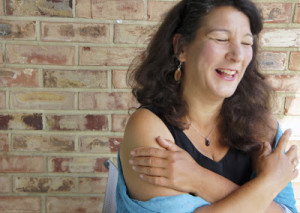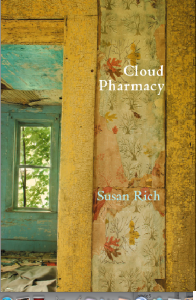The Writers Who Read series continues this week with poet Susan Rich.
 Who are you?
Who are you?
I am a word addict. I’m into confetti and aquamarine; I love double-barreled words like “doorknob” and “backstabber,” “watermelon” and “windowpane” where I can grab two images for the price of one. Mostly, I answer to “poet” with a new book, CLOUD PHARMACY, still fresh from White Pine Press and “literary activist” because I’ve co-founded several organizations including Poets on the Coast: A Weekend Writing Retreat for Women.
If you’d like to know more about me there are a 101 links at my website and a “Top 10 Things to Consider When Sending Your Work to a Contest or Residency” at my blog.
What are three beloved books you first read before the age of 12?
Half Magic by Edward Eager concerning a mysterious coin that can take you back in time.
The Phantom Tollbooth by Norton Juster where we enter a new world with a dog named Tock for company and try not to get trapped forever in the land of Doldrums.
Wet Magic by Edith Nesbit (everything by E. Nesbit) where a gaggle of children find an underwater city where I so wanted to live that I read this book multiple times.
What is one book you are always recommending to friends and family (and maybe the local barista) as an adult?
Stones for Ibarra, by Harriet Doerr, is a novel based on Doerr’s time living in Northern Mexico with her husband. As a young couple, the two leave California to revive her husband’s family’s copper mine and thereby revive the small town. It’s Doerr’s first book and it won the American Book Award. But that’s not the cool thing. The cool thing is that she wrote Stones For Ibarra when she was 73. I read this novel when I was 27, recently returned from the Peace Corps, and feeling like an alien in my own country. This book saved my life.
What is your book kryptonite–those unique elements in a book, beyond just great writing and three-dimensional characters, that make you unable to resist reading?
I’m happiest with a novel that exists in another country and in another time, but is not a historical novel. Examples of what I mean include Anthony Doerr’s All the Light We Cannot See and Helen Humphries, Afterimage. These novels focus on the lyrical lives of the characters; and they do not spend pages describing period tablecloths.
What is your ideal time and place to read?
Long train rides on Sundays. In my writing studio in the late afternoon. In bed anytime.
Which books have had the biggest influence on your writing?
Elizabeth Bishop, Collected Poems.
Edna St. Vincent Millay, Collected Sonnets.
Carolyn Forche, The Country Between Us.
How do you balance reading and writing in your life?
Balance? I often read to get “in the mood” to write. I read on trains and planes; I read at writing retreats. I don’t read enough anymore…
Choose your preferred book form: ebook, physical book, or audio book?
Physical books — I need to touch paper pages and write with blue pen in the margins.
Do you consciously plan your future reading–i.e., set book goals, keep a TBR list, participate in book challenges or book clubs? Why or why not?
I read without structure. The exception to my meandering reading style happens when I work on historical poems such as the sequence in Cloud Pharmacy inspired by the 19th century photographer Hannah Maynard. In this case I read everything I could find on Maynard, the proto-surrealist outsider artist as well as books on early photography. Recently, the poet Rick Barot mentioned that he keeps a list of all the books he reads. This is something I did as a young person when I first began to read. Each book was listed by title, author, number of pages read (!) and my own five star system. It seems I’m going to start this up again!
What are you reading now?
For Memory Wall by Anthony Doerr (having just finished his new, fantastic book, All the Light We Cannot See).
Life? Or Theater? by Charlotte Salome
My Life as a Foreign Country by Brian Turner
Chagall: Love and Exile by Jackie Wullschlager
You can find out more about Susan on her website or Twitter.

Love that picture! Thanks for sharing a bit about yourself, Susan.
I also love those 3 poets! I haven’t picked up my Carolyn Forche books in years. This was a good reminder to read more poetry. 🙂